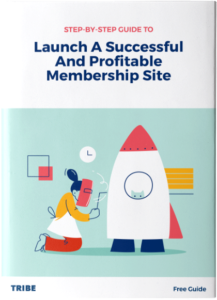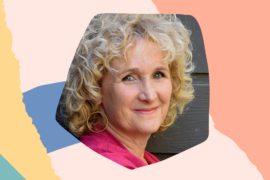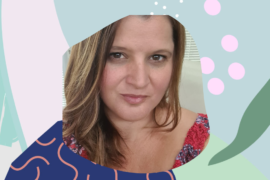Over the last 100 episodes of this podcast, we’ve featured entrepreneurs in every stage of their journey. We’ve spoken to business owners who launched incredible membership sites just days or weeks before being interviewed, as well as experts who have been doing this for years. We’ve even featured entrepreneurs twice as they’ve made powerful pivots and adapted their business models to match what their audience needs as the world changed around them.
On this podcast, we’ve focused on heart, love, and innovation, and shared beautiful stories along the way. To celebrate our 100th episode of It’s A TRIBE Thing, we’re flipping the script. Today, founder Stu McLaren interviews host Shelli Varela to share wisdom from 99 game-changing entrepreneurs!
Key Takeaways
- Why people who launch membership sites are so inspiring, giving, and generous – and how they meaningfully serve others while generating recurring revenue.
- How Jamie Swanson brilliantly changed her membership site after the onset of the COVID-19 pandemic – and how to use her techniques and wisdom to make a pivot of your own if something isn’t working.
- Why virtually no idea is too niche for a membership business.
- What makes the best business stories so memorable – and how to think about your audience as you craft your message.
Free Give
FREE Guide – Launch & Grow a Profitable Membership Site
Ready to reclaim your time and attract more monthly paying customers? Our step-by-step guide will show you how to build a membership site that turns your passion into recurring profit. Click here to download!
Memorable Quote
- “If you put a canary in a coal mine and the canary doesn’t do well, the problem is not with the canary. The problem is its environment.” – Glennon Doyle
- “You’re juxtaposing regular and remarkable and in between that lives the bridge of possibility. The thing is, if you have something that you’re able to teach or share, then you are the only possible option for them to follow because you have inspired them because they hear your story but they feel their own and they are inclined to want to come with you.” – Shelli Varela
Episode Resource
- Yes University
- Jamie Swanson – The Modern Tog
- Dayna Abraham – Lemon Lime Adventures
- Cathy Hay – The Peacock Dress
- Think and Grow Rich
Transcript
Read The Transcript
[INTERVIEW]
Stu McLaren: Shelli Varela, thank you for joining me here today. We are completely flipping the script and I’m going to be talking to you because we are celebrating 100 episodes of the It’s a TRIBE Thing Podcast. So, Shelli, thanks for joining me.
Shelli Varela: Oh my gosh, my absolute pleasure, pleasure to host, pleasure to hang out with you today, and most of all, pleasure to talk to your amazing TRIBErs like talk about inspiring stories. Holy smokes.
Stu McLaren: Well, I know and we have now had this is our 100th episode. So, you essentially have done 99 episodes with our amazing TRIBErs and there have been some incredible stories that have bubbled up. That’s kind of what I want to talk to you about here today because being on the other side of the mic, you’ve had a chance to really distill all that has happened in these conversations. What I would love to kind of dig deep on are what themes are you seeing emerge from the stories of the people in our TRIBE community as they share what they’ve done to grow their memberships?
Shelli Varela: For sure. Well, first of all, I want to say that like doing this podcast for me is like soul food because each and every time I get to sit down and talk with these people, I get to pull the stories out of them but also, like just so inspiring and giving and generous. And so, hats off to you for creating an amazing community. But in terms of themes, what I’m noticing is absolutely the spirit to give and to give more than they receive and the ability to just share their stories and their gifts and the things that they’ve learned and have, their knowledge and experience in a way that benefits other people. I just get so lit up watching the ripple effect of what they do. These individuals are all so humble and I just love being able to like hold up the mirror and go, “You’re freaking amazing, like what?” and just show them the ripple effect of what they’re doing when you play that out and follow the route all the way back and just kind of just be able to echo back to the brilliance that they’re putting out into the world.
But in terms of themes, the common thread for sure would be service. The common thread for sure would be having that recurring revenue and also being able to create something in the world that is in alignment with who you are, that is true to who you are. I have this saying. I call it the yes effect and it’s that zero point when your body tells you the truth, when you know that you’re onto something that is yours that is true. I see so many of these people who have a job and think that having a membership site or having their gifts are the thing that lights them up, be their thing, be their income, be their business, be their recurring revenue, and to just watch them get switched on in that moment when they’re like, “No, this is true for me,” and just grip it and rip it and go for it. It doesn’t have to be perfect and it doesn’t have to be amazing but the irony is I always like to trace back to the moment where they first had the idea. Because for those people who are listening to the It’s a TRIBE Thing Podcast, some of them are TRIBErs and many of them are just hearing about membership sites for the first time.
So, for those people, most of those people are sitting on the precipice of something that could be great and could be freeing and could have that ripple effect and be rewarding and also have that recurring revenue. So, I always like to take them back to that moment where it’s like before you did the brave thing and just did it not perfectly and didn’t have it all figured out, how did you feel just before that? Because for all of those people who are listening, they’re looking at these individuals like, “Well, I’m not sure if that’s possible for me, or I don’t know if I could grow my membership site to that.” But it really is more a case of the people that are doing it, the people that are in those positions of inspiration that we look to are just doing it scared to start with like courage is just fear in motion and just saying yes to the true thing and then going on and time and time again just watching them get so rewarded and so lit up and so satisfied, being able to just love on their people and give their gifts and actually get paid for it again and again and again.
Stu McLaren: Well, and you said a couple of things there and I was taking notes because I think one of the beauties about the It’s a TRIBE Thing Podcast is that we get to feature people who are in all different stages of their entrepreneurial journey. Some people who literally like are in the very early beginnings of it and they’ve literally just had the idea and they did their founding member launch and got it off and they’re rocking and rolling, and then we’ve got people who are certainly more seasoned and they’ve been doing this for a longer period of time. But the thing that I heard from you say over and over again there is service. And so, I want to come back to that like is there a particular story of the many episodes that we’ve done that stands out to you in terms of somebody who kind of exemplifies that theme of service?
Shelli Varela: For sure. There are many, for sure, countless. We don’t have that kind of time, but there are a couple that stands at top of mind and one of them is the incredible Jamie Swanson. She’s actually been back for her victory lap. She’s been on the show twice. And the reason why like, I just am so inspired by her because to start with, she has this membership site where she’s teaching brand photographers how to do their thing and she’s incredible. Then COVID hits and brand photographers like the photography industry dried up for a period of time or at least waned. And so, this thriving business that she had was not thriving all of the sudden so she had to pivot just like many of us do. But the thing that I just am obsessed with about Jamie Swanson is, first of all, she’s just such a quick start and she’s just such a genius. But the thing I loved about the second interview we did when we were talking about that pivot and we were talking about, “I just have to figure it out, I just have to move in a different direction and essentially start again,” was a TRIBE Live I think two years ago. I had the privilege of watching Jamie when she was just being Jamie in her zone when she’s just giving away information and tips and tricks.
I don’t think she even realizes how genius she is and I watched this like almost Pied Piper movement as she was walking through the convention center and these people were asking her questions, and she’s just giving it away like trick or treating candy, like it was just incredible. And so, it was not lost on me that when she pivoted, she pivoted to help people learn how to do masterminds and sort of the business side of things because it’s just one of those things that’s almost infused in her DNA. For our listeners and also for our guests, we have those gifts that come so easily to us that we don’t even acknowledge them as a gift as it’s like, oh, it’s common knowledge and really just tapping into the fact that we have so much we are able to give and often the things that come easiest to us are the things that that are most successful, most beneficial and easiest for us to give to our audience. Oftentimes, we think business needs to be hard or it needs to be effort-y but the truth is when you get in that zone and when you’re in that ultimate yes like, “Yes, this is my truth, this is my thing,” oftentimes, it really doesn’t have to be that hard.
And so, watching Jamie just sort of do that pivot in the middle of a pandemic and just crush something brand new is, first of all, a testament to how smart she is, but also that it’s possible for all of us. If we’re efforting towards a thing and that thing isn’t working, we do have the ability to say, “Okay, like, what else can I do? Or how else can I pivot or make a change so that it feels good for me and it feels good for my audience?”
Stu McLaren: Yeah. It’s amazing too because I think like as business owners and as membership site owners, we’re all going to need to make changes and pivots at some point. I think certainly COVID forced a lot of people’s hands in that and you can either like step back and curl up in a ball and shrink and hide or you can face the reality of what is, lean into it, and as you said, lean into your gifts, and Jamie’s gift certainly is on the service side and really showing up for people and she’s incredible at cultivating community which is what has led her to the thing that has always been easy for her, which is bringing people together and in the form of masterminds. So, that’s an awesome story. Now, speaking of like awesome stories, who else kind of stood out for you? I know like obviously, everybody stood out for their own reasons but were there other guests or TRIBErs who stood out for you as you were interviewing them?
Shelli Varela: I have a real soft spot for Dayna Abraham. To your point, like I literally could give you 99 amazing stories so it’s almost impossible to pick but I remember being really impacted by Dayna because she deals with kids that are out-of-the-box, and she really kind of flips the switch on the narrative of how to help kids thrive. The amazing thing about that it’s just listening to the way she thinks and the way she solves and creates a solution for something that societally is a problem or is something that kids struggle with. She really just made all of that a gift and just seeing the genius and the brilliance in these kids and realizing that the only reason they’re not thriving is just a quarter turn, right? It’s just because they’re not thriving in that environment. Glennon Doyle is one of my favorite authors and she has this saying. She says, “If you put a canary in a coal mine and the canary doesn’t do well, the problem is not with the canary. The problem is its environment.” And so, for Dayna Abraham, I just loved that she was able to see these amazing kids for the gifts that they are and create an environment and create a support system, essentially, for the people that have the privilege of having these amazing kids in their lives.
And so, I just love the heart and the love, and also the innovation. I think that is something regardless of whether we’re dealing with out-of-the-box kids as she calls them or anything else, it’s just if we can look for what is the gift in this, there is always a solution. I love that what she’s creating for these amazing kids is just, if you play it forward in time is just absolutely life-changing. To watch somebody like that just be a leader and to show other people who maybe don’t have the tools or the resources or her just incredible intuitive insight, to be able to take advantage of that and help their own kids thrive in the same way.
Stu McLaren: Yeah. It really is a beautiful story because, I mean, I think what Dayna in some sense, we all relate, being that kid. You know what I mean? I was just having a conversation with my daughter this morning and all her friends are wearing a certain type of clothing and she doesn’t. And so, she’s feeling out of the box because she’s different. I think whether we have experienced that ourselves as kids or we have kids and experiencing it, the thing that makes Dayna’s work so powerful is that it has that long-term ripple effect. This is why our work matters and I think that one of the things that as a common thread through all of our TRIBErs is just that this work that we get to do has a long-term ripple effect and I can only imagine the ripple effect that Dayna’s having for not only the parents in her community but the kids and then what that’s going to make possible so super inspiring. Were there other stories that stood out for you?
Shelli Varela: I use this example a lot. The amazing Cathy Hay has a membership site and her specialty is high-end corsets. And so, the reason I talk about her so often and the reason that I’m so obsessed with her is because if anybody ever is saying they don’t have a membership site or they don’t have an idea or a niche or their niche is too small, here is this incredible woman who you can’t get much more niche than high-end sort of like movie-grade art pieces of corsetry if corsetry is even a word.
Stu McLaren: Yeah. These are like I think of like old school almost like medieval times like super elegant. In fact, my wife and I are watching a series on Netflix right now called the Musketeers and I’m seeing I’m like that’s what Cathy does right there, all the women that are wearing all that stuff. Yeah.
Shelli Varela: Yeah. So, the thing that I love about Cathy is, yes, like it is ultra-niche like I don’t know what the population of people that are interested in that, but it can’t be massive. But the thing that I also love that she does and I use this example so often is she uses her resources and her connections and the enthusiasm of her members in her audience to create her own content like the incredible Napoleon Hill is the gentleman who wrote the book Think and Grow Rich, and essentially he studied millionaires or billionaires of the time but he himself was not a millionaire. It’s kind of like Cathy does that in the same way like it’s a curation of other people’s genius and being able to feature them so that you get overall a more comprehensive look at the entire landscape of what it is she’s doing. And so, I love that like that is just the ultimate objection buster. It’s like, “Oh, you want to talk about a niche? Here is a woman who’s crushing it and she’s yes doing it but she’s also curating the genius that is cumulative in her community.”
Stu McLaren: Yeah, it really is. Just a great story for those two reasons. And tapping into the collective wisdom of the community is something that I hope all membership site owners, when they’re listening to this really take to heart because there is so much genius within your own community, and Cathy’s like the poster child of being able to tap into that, and certainly carry that genius over and share it with so many other people right within her membership. So, great, great example.
Shelli Varela: A wise man said one time, “They come for the content but they stay for the community,” and that is absolutely true. Just the vibe and just the energy and I see it again and again like these people just feeding off the energy of each other.
Stu McLaren: Yeah, 100%. Well, buddy, listen, as we continue to wind down here like I want to ask you, have there been any other unique episodes that stand out for you?
Shelli Varela: Oh, my goodness, so many unique in their own way, I would say. I don’t know if there’s one that stands out specifically. I know that for me, personally, I am deeply impacted by each and every person and episode and experience but I will say that my great gift for doing this is being able to hold up a mirror to people that are just so humble and so incredible, and just echo back to them what they’re doing and what they’re giving the world is just I don’t know that I could pick one specific episode that that is like, this is the pinnacle one, just because I am personally moved each and every time I press record, and having the privilege of being able to share these stories and dig a little bit deeper into who these people are and how they got to be the person they are.
Stu McLaren: So, let me ask you about that because, I mean, this really is your area of expertise is being able to extract somebody’s story. So, what makes a person’s story memorable and unique? So, the media wants to hear more and it’s easy to attract the kind of people that we want in our membership. From your experience interviewing literally hundreds now for the It’s a TRIBE Thing Podcast, what makes a person’s story memorable?
Shelli Varela: Well, first, I will say when you’re telling a story for anybody listening, nobody cares to understand you until they first feel understood. And so, unless somebody first feels understood, the story they’re hearing is somebody else’s story and then you’re always battling this uphill challenge of trying to make that connection because they’re hearing somebody else’s story and you risk losing their attention but, for example, you take somebody’s story who is inspiring and by all means is extraordinary, that in and of itself is inspiring to the audience, but not necessarily relatable. So, what I like to do with the people before I hit the record button is echo back to them that they are extraordinary but the way to connect with the audience is to start before you were extraordinary, before you had it all figured out, to start when you were actually just ordinary, and there is like this magical emotional math that happens in the minds of the audience. If you started out as ordinary and you are broke, broken, homeless, hadn’t come out to your parents, doubtful, fearful, living in a car, whatever that looked like then in the minds of the audience, they’re like, “Oh, I have had struggled too so I am you and if I am you, and you did that amazing thing, then my version of that amazing thing is possible too.”
And so, essentially, you’re juxtaposing regular and remarkable and in between that lives the bridge of possibility. The thing is if you have something that you’re able to teach or share, then you are the only possible option for them to follow because you have inspired them because they hear your story but they feel their own and they are inclined to want to come with you.
Stu McLaren: So, I’m writing this down. Shelli. I love that. You are the bridge between regular and remarkable. And so, it’s really, really important when you’re sharing your story to make it so that people can relate and they can connect and find that thread of connection. Do you have any final thoughts on as people are moving forward and looking to create that connection with their audience on ways to go about doing that effectively?
Shelli Varela: I would encourage them to, first of all, not think of their audience as an avatar, but as a human being, and as such, there are commonalities between the person who’s delivering the story and the person who’s hearing the story. So, I would say like before you moved on the thing that became the reason you’re telling the story so whether that be a business or an accomplishment or whatever that looked like, who were you just before that happens? And dig deep into the emotion of like, how did you feel just before you took the action, did the brave thing, started the business, push play whatever that looks like because that is where your audience is living. So, when you’re starting to tell your story, definitely start there because, again, they will hear your story, feel theirs, and then they are invested in your story. For those of you who are telling your story on the regular and you really want to bring the audience alongside you, there is a science to story and a synergy to story and when you allow your audience to feel like they are you, there is that certain point in the audience’s journey where they haven’t done the brave thing that you’ve done.
So, when they’re listening to your story, they want you to win and they need you to win. Especially for those people who speak on stages, if ever there is a point of nerves for you, if you tell your story properly, you will have the entire audience cheering for you because they need you to win because they are you and it’s the same whether you’re doing an interview, it’s the same whether you’re being featured in the media, it’s just really creating that synergy that you can make that bridge of possibility and lead your people across it.
Stu McLaren: Alright. This has been awesome. I want to make sure before we wrap up that we also let people know how they can learn more from you because this is one of the things that you do is you’re helping people certainly shape their stories, craft their stories, position themselves and their stories for the media, whether that media be other podcasts, whether it be online Facebook pages and Facebook Lives or whether it’s mainstream media, all of which, obviously, to generate more eyeballs and traffic and so forth for our memberships, and that’s ultimately what we’re trying to do. We have memberships where we’re there to help serve people. So, how do we attract more people to it? This is certainly getting your story nailed down so it connects and relates to people and spreads is a really important part of that. Where can people go to learn more about that from you?
Shelli Varela: Absolutely. So, I’m doing a seven-day challenge called Craft a Story the Media will Share and the reason being featured in the media, and again to your point, media doesn’t have to be Forbes, although it definitely can be. It’s whatever platforms that your audience and your humans are hanging out on but it’s so important to be able to share your story in that way because it’s like my pillars of getting seen and getting featured and becoming known and having your voice be heard, the four pillars are voice, truth, possibility, and story. When we can echo that for ourselves, we can express that for ourselves, our story becomes juicy and almost creates this vortex where your story becomes it has its own like momentum around it, and the more people hear it, the more people want to hear it. The beautiful thing about being featured in the media is that you don’t have to brag yourself up because you’re being interviewed in such a way that they get to like mine the genius out of you and you don’t have to have that uncomfortable, humble moment about, “Well, I don’t want to really talk about how amazing I am,” and the truth is you are amazing and you should be featured and people can’t benefit from you unless they hear about you, know about you, and have the opportunity to work with you.
So, if that sounds like a yes for you guys, again, it’s Craft a Story the Media will Share and you can find me at YesUniversity.com because we’re all about getting those yeses.
Stu McLaren: Amazing, Shelli. I’m going to bring it back to you for final thoughts here in just a minute. But before I do, I just want to kind of recap what we’ve talked about. In nearly 100 episodes, well, this is the 100th episode of It’s a TRIBE Thing. Obviously, Shelli has dove deep into the stories of our incredible TRIBE community and she started off by just saying, look, there are so many common themes here. Service has been a huge one where people are sharing their gifts in service of others. She said also, obviously, the stability that comes with recurring revenue was a big theme and how that transformed so many of these businesses, but she said when it came to interviewing the person, she said, there was just so much alignment between who the people were and what they were getting to do. She said it was really inspiring just to hear the stories of people who just went for it. They didn’t get it right. They didn’t get it perfect, but they got it going. Because of that, it created a ton of momentum. And she said, there are clues all along the way throughout these stories, one of them being that sometimes it’s that thing that comes easiest to us and that’s really the sign.
And she shared how with Jamie Swanson, one of our amazing TRIBErs, who’s been a pillar in our TRIBE community had to make a real important pivot because her old membership, which was in service of photographers really had a major downturn during COVID. As such, she had to make a pivot and she leaned into the thing that did come easy to her, which was crafting community, and certainly showing up and bringing people together and being of service. Because of that, she’s now gone into a whole different direction which she came back and talked about on the show, which was awesome. Then she talked about how Dayna Abraham’s story really stood out for her because of the ripple effect that Dayna’s work is doing and this was a common theme amongst everybody is that our work matters. What we do matters and to take pride in that and to really lean into the gift that we are giving our audience and the ripple effect that’s having. She also said another memorable story was Cathy Hay and Cathy is in the market of corsets, and teaching people how to create these beautiful corsets. It’s super ultra-niche but the other thing about it is that Cathy’s not the “head expert” so to speak. She taps into the wisdom of the community and really uses her resources, her connections, and taps into other people contributing and therefore her curating that experience.
And then as we wind down, one of the things I loved that you said, Shelli, was that nobody cares to understand you until they feel understood. We just talked about how your story is the thing that makes and creates that bridge between the audience listening and where you are now and you got to find those connection points, you got to make your story relatable, and you gave a great big tip, which was go back to that place of who you were just before the breakthrough, really visualize that moment, connect with that moment, because that’s where your audience is, and when you can go there, that’s when your story becomes memorable.
Shelli, thank you so much, buddy. I can’t even begin to describe how valuable you have been as a source of wisdom and guidance and for our TRIBE community. I’m just so grateful to have you hosting our It’s a TRIBE Thing Podcast. I couldn’t think of anybody more perfect to be able to bring out other people’s stories, and I certainly hope people go to YesUniversity.com, join you for the upcoming challenge that you’ve got, which is all about crafting the story the media will share. Super powerful because the more we can tell that story and the better we can tell that story, the easier it’s going to be to attract people to our memberships. As we wind down, any final thoughts?
Shelli Varela: I will say this. I think people really need to fully acknowledge the value that you bring to other people and we can say audience and we can say avatar or we can say member, but really it is human beings and everybody’s looking for a place to like believe, become, and belong. When we can articulate how they can believe, become, and belong with us and in our ecosystem, it not only creates an incredible community of people that are there for the right reasons and supporting each other, but that has an energy in and of itself that goes out into the world and does the work that we needed to. So, it’s been my amazing privilege to be able to tell these people’s stories and spend some time with them one-on-one so thank you to you, my friend.
Stu McLaren: Shelli Varela, you’re amazing. Everybody go to YesUniversity.com, join Shelli for the upcoming challenge. And, buddy, thank you so much for being just an amazing host of the It’s a TRIBE Thing Podcast.
Shelli Varela: My ultimate pleasure. Thanks, buddy. Appreciate you.
Stu McLaren: Shabaam!
[END]
To learn more and get access to all episodes, visit our podcast page!






